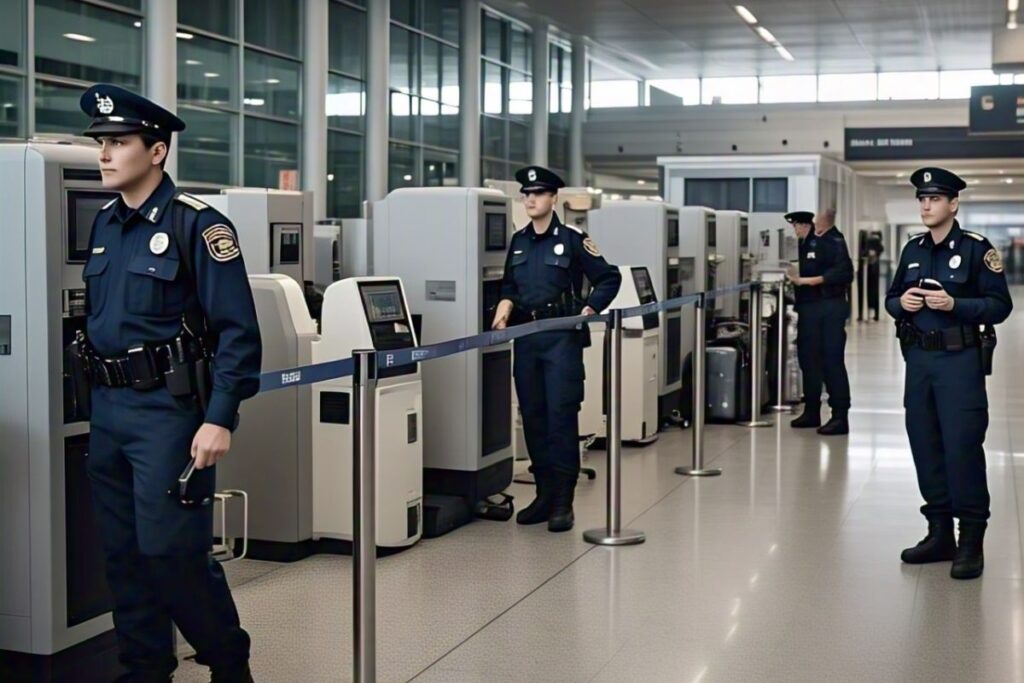The Role of Security Guards in Airport Security
September 26, 2024
Passenger screening is one of the most visible and crucial tasks handled by airport security guards. Their primary responsibility is to ensure that no prohibited or dangerous items make it past security checkpoints. Security guards work alongside technology, using X-ray machines to scan luggage and metal detectors for passengers. However, their expertise goes beyond operating these machines. They are trained to interpret the results and identify potential threats that machines may miss, such as cleverly concealed weapons or dangerous substances.
Security guards also play a key role in the physical inspection of baggage. If something suspicious is flagged during the scanning process, guards are responsible for conducting thorough manual inspections. They follow strict protocols, ensuring that searches are conducted professionally and respectfully, while maintaining a high level of security.
Additionally, security guards are often the first line of defense against human-based threats, such as identifying nervous or suspicious behavior in passengers. Through behavioral analysis and situational awareness, security personnel can prevent potentially dangerous individuals from boarding flights, thus safeguarding the passengers and crew.

Access Control and Monitoring
Airports are complex environments, with many restricted areas that require controlled access. Security guards manage these zones, ensuring that only authorized personnel can enter sensitive areas such as runways, baggage claim zones, and air traffic control towers. This is done through strict verification protocols that include checking ID badges, biometric scans, and monitoring security clearance levels.
Access control is not just about guarding gates or doors; it requires guards to be highly alert to potential infiltration attempts, such as the use of forged credentials or tailgating (when unauthorized individuals attempt to follow an authorized person into a restricted area). Guards need to be familiar with the layout of the airport and the personnel who work there, so they can quickly identify anyone who shouldn’t be in a particular zone.
Moreover, security guards monitor traffic in and out of restricted zones in real-time, ensuring that operations run smoothly without any unauthorized intrusions. Their vigilance is critical in areas like cargo handling, where even a small breach can result in security risks, including theft, sabotage, or smuggling.

Surveillance and Patrolling
Surveillance and patrolling form the backbone of airport security. Security guards constantly monitor both public and private areas using CCTV systems and physical patrols. Surveillance allows guards to keep an eye on a broad area of the airport, enabling them to respond quickly to suspicious activities or potential threats.
Patrolling, on the other hand, serves a dual purpose: providing a visible deterrent to criminal activity and ensuring that all areas of the airport are physically secure. These patrols are often conducted on foot, by vehicle, or even through canine units trained to detect explosives or drugs. The physical presence of security guards is a key factor in preventing crimes such as theft, vandalism, or terrorism.
Guards must also be adept at multitasking during patrols, including checking that emergency exits are clear, equipment is functioning correctly, and sensitive areas remain secure. They report any anomalies or breaches immediately to airport security command centers, ensuring swift corrective action.

Handling Emergency Situations
Airports are high-stakes environments, and security guards are often on the front lines when emergencies occur. These emergencies can range from medical incidents and fire outbreaks to more serious situations like bomb threats or active shooter scenarios. Security guards are trained to remain calm under pressure and follow established emergency protocols, which helps ensure the safety of passengers and staff.
In the event of a medical emergency, guards are often the first responders, providing first aid until medical personnel arrive. They are also trained in crowd control, which is essential in preventing panic during evacuation procedures. Whether guiding passengers to safety or assisting with fire drills, their quick thinking and expertise can be the difference between order and chaos.
When more severe threats arise, such as potential terrorist attacks, security guards play a pivotal role in coordinating with law enforcement agencies, bomb disposal units, and other emergency services. Their clear communication and swift action can mitigate damage, protect lives, and restore order.

Assisting Law Enforcement
Security guards in airports do not operate in isolation. They work in close collaboration with law enforcement agencies, including local police, federal authorities, customs officers, and immigration officials. Together, they form a cohesive security framework that ensures all areas of the airport are protected from both domestic and international threats.
Security guards assist law enforcement in a variety of tasks, such as detaining individuals suspected of criminal activities, conducting investigations, and gathering evidence when necessary. They may also participate in joint security operations, such as anti-terrorism drills or response strategies for high-risk situations.
In cases involving smuggling, human trafficking, or organized crime, airport security guards are often the first to identify suspicious behavior or activities, working closely with customs and immigration authorities to apprehend suspects. Their coordination with law enforcement is vital for intelligence gathering and overall airport security strategy.

Customer Assistance and Communication
While airport security guards are primarily tasked with protecting the airport and its passengers, they also play an important role in customer service. Guards are often the first point of contact for travelers seeking assistance, whether it’s asking for directions, resolving minor issues, or providing information about airport procedures.
Effective communication is critical, particularly when diffusing tense situations. Security guards must be able to de-escalate conflicts and calm frustrated or anxious passengers. This requires strong interpersonal skills, patience, and an ability to assess situations quickly. Additionally, in cases where security measures inconvenience passengers (e.g., long lines at checkpoints), guards must balance their security responsibilities with maintaining a positive, helpful attitude toward travelers.
By assisting passengers and ensuring clear, efficient communication, security guards contribute to a smoother and more pleasant travel experience, which in turn enhances the overall image of airport security.



